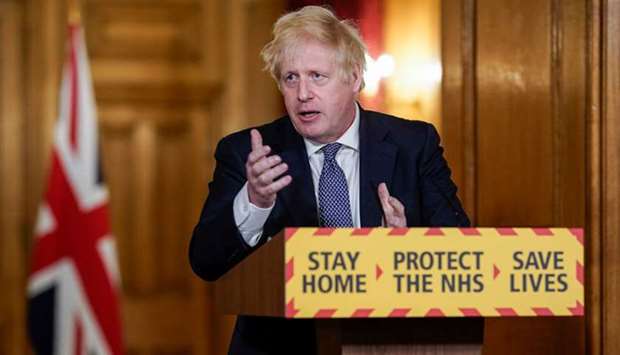The coronavirus lockdown will ease next week for most of Britain’s population, Boris Johnson announced yesterday, as a row persisted over the prime minister’s closest adviser taking a long-distance journey during lockdown.
In England, up to six people will be able to meet outside and schools will gradually reopen from Monday, Johnson said at a news conference where he was again challenged over his aide Dominic Cummings’ decision to drive 425kms during lockdown.
“These changes mean that friends and family can start to meet their loved ones, perhaps seeing both parents at once or grandparents at once,” he said, adding that outdoor retailers and car showrooms would also be able to open from Monday.
“You could have meetings of families in a garden, you could even have a barbecue provided you did it in a socially distanced way, provided everybody washes their hands, provided everybody exercises common sense.”
Johnson stressed that the changes were “small tentative steps forward”, and health experts warned the situation remained finely balanced with new cases declining, but not very quickly.
The devolved governments in Scotland, Wales and Northern Ireland are responsible for their own public health policy.
Johnson’s announcement came hours after more lawmakers from his Conservative Party called for Cummings to quit.
The prime minister also faces criticism for his handling of a pandemic that has left Britain with the world’s second-highest death toll.
Cummings travelled from London to Durham in March with his four-year-old son and his wife, who was sick at the time, to be close to relatives.
A YouGov opinion poll showed a majority of Britons think Cummings should resign for — in their view — breaking the lockdown rules, but Johnson has said he acted with integrity.
At the news conference, Johnson blocked questions from journalists put to his top medical and scientific officials about Cummings’ behaviour.
Johnson said he wanted to “protect them from...an unfair and unnecessary attempt to ask a political question”.
The two officials, chief medical officer Chris Whitty and chief scientific adviser Patrick Vallance, also said they did not want to be drawn into politics.
Meanwhile, police in Durham said Cummings will not face action despite a possible “minor breach” of coronavirus lockdown rules. Cummings has been under investigation by police in Durham.
The Durham Constabulary did not consider the March 27 trip as an offence, and said they also investigated an April 12 drive where Cummings said he drove to Barnard Castle to test his eyesight.
Police concluded that there might have been “a minor breach” of lockdown regulations, citing automatic number plate recognition (ANPR), witness evidence and remarks Cummings made at a May 25 press conference.
“Durham Constabulary view this as minor because there was no apparent breach of social distancing,” the statement read.
If a police officer had stopped Cummings “driving to or from Barnard Castle, the officer would have spoken to him, and, having established the facts, likely advised Cummings to return to the address in Durham,” the statement added.
A spokesman for the prime minister said Johnson believed Cummings “behaved reasonably and legally given all the circumstances and he regards this issue as closed,” the Press Association (PA) news agency reported.
The dispute over Cummings has prompted some to lose faith in the government’s strategy, with many people unable to understand how a senior official had broken the rules by driving across the country when the government repeatedly told people to “stay home” and “save lives”.
The move to ease lockdown measures came as England launched a new testing and contact tracing system yesterday for Covid-19 patients, seen as crucial to helping ease lockdown measures. Contacts of those who test positive for Covid-19 will be asked to isolate for 14 days, even if they have no symptoms.
The tracing service, which will have a task-force of 40,000 specialists to test those with symptoms and identify their contacts, will initially rely on what the government described as people doing their “civic duty”, but sanctions could be introduced if people did not comply.
Scotland, Wales and Northern Ireland have similar programmes just about to launch or already running.
Britain abandoned a strategy of testing and tracing in March when the virus started spreading exponentially and there was insufficient capacity to test more than a fraction of those with symptoms.

Prime Minister Boris Johnson holds the daily news conference on the Covid-19 outbreak at 10 Downing Street in London, Britain, yesterday.
